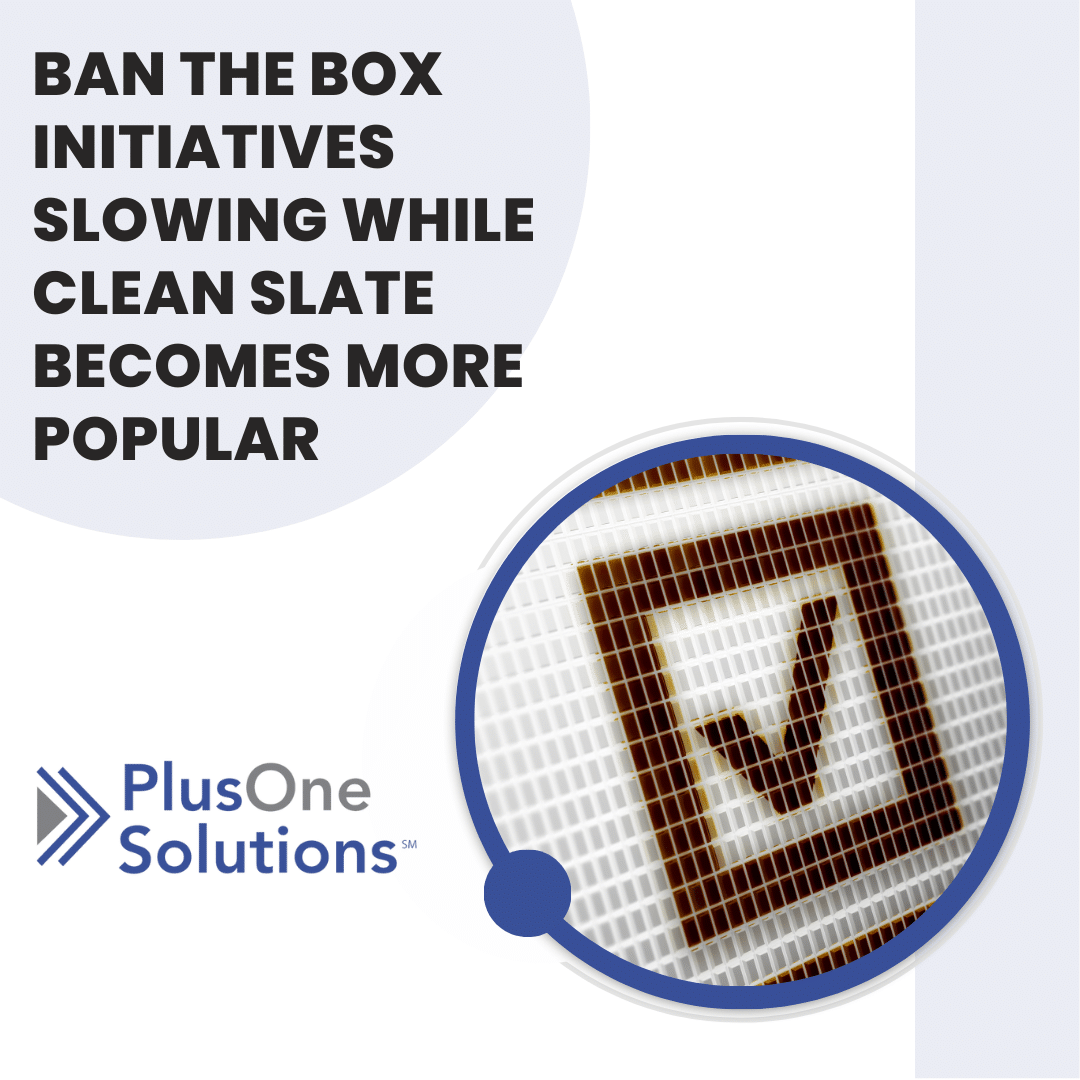Call Us Today (877) 943-0100
Ban The Box Initiatives Slowing while Clean Slate Becomes More Popular
Industry Information | May 24, 2023
One notable trend in criminal justice reform over the last decade has been the explosion of Fair Chance and Ban the Box laws. If your organization directly hires employees or contractors in the United States, you should be aware of recent changes that have come to the city, county, and state legislation, commonly known by the name of “Ban the Box” or “Fair Chance Hiring.”
What are Ban the Box Laws?
Ban the Box laws were designed to prevent organizations from discriminating against individuals with criminal records. These laws were designed to eliminate the “box” on the job applications that applicants would check if they had a previous criminal record. However, over the years it has become apparent that these fair chance initiatives, as they may also be called, are not necessarily sufficient for individuals who have previous convictions as they do not remove the stigma of a criminal record, the potential obstacles a criminal record may pose for contracting, employment or housing opportunities and the fact that criminal information about the individual may still be shared with others.
Over the last two to three years, a compliment has arisen to these Ban the Box laws called clean slate laws. At present, about ten states have clean slate laws. These clean slate or expungement programs are designed to clear eligible criminal records from an individual’s overall record and background, essentially giving them a “clean slate” from which to move forward from. Some initiatives propose this be an automatic process when specific requirements are met, while others are done upon application. In either approach, the goal is to incentivize rehabilitation and reward individuals who have been able to remain out of criminal issues and allow them a second chance at opportunities. More information can be found in this previous blog How the Sealing of Some Criminal Records Could Impact Contractor Background Screening.
Additionally, expungement programs allow individuals with past convictions to have their criminal records sealed or “expunged” upon completion of their sentences or after a set period, so they no longer appear on their public record. This process is meant to give rehabilitated candidates the opportunity to present themselves without the fear of being undermined by their past mistakes, allowing them to compete fairly for economic opportunities.
Clean Slate Laws
It should be noted that these clean slate laws do not erase everything. Generally, only individuals with misdemeanors and those with low-level felony records are eligible to have their records erased. Serious crimes are not typically eligible for expungement and clean slate efforts, and these are the type that would be most relevant and considered for determining risk for an organization. For example, some clean slate laws are structured like this:
- Individuals with a classified or unclassified misdemeanor offense will be eligible for their record to be erased after seven years if the offense occurred on or after Jan. 1, 2000;
- Individuals with any class D or E felony or an unclassified felony offense carrying a term of imprisonment of not more than five years will be eligible to have the record erased after 10 years if the offense occurred on or after Jan. 1, 2000.
- Individuals with charges such as family violence, nonviolent sexual offenses, and sexually violent offenses are not eligible.
Clean slate initiatives and expungement programs replace the Ban the Box laws by creating a more comprehensive approach to address the obstacles facing individuals with criminal records. Together, they help to reduce the adverse impact of past convictions and improve employment opportunities for candidates who have demonstrated rehabilitation and a willingness to become productive members of society. It is increasingly being looked upon as an effective catalyst to ensure prison reform and to address the long-term implications that follow people after being incarcerated.
Does this mean Ban the Box and Fair Chance laws are a thing of the 2010s? We don’t think so, but the creation of new laws has slowed down and this change in direction to clean slate initiatives seems to be the current trend for the support and opportunities it provides for previously convicted individuals to become productive members of society if they remain crime-free. We will continue to monitor this trend and the impact it has on the background check process for our customers.
Contents are provided for information purposes only and should not be construed as legal advice. Users are reminded to seek legal counsel with respect to their obligations and use of PlusOne Solutions services.
About PlusOne Solutions
PlusOne Solutions has been an industry leader in the risk management field by specializing in compliance programs that meet the complex challenges of geographically dispersed contractors, vendors, and employee networks. PlusOne Solutions protects companies from possible financial, legal, and reputational risks associated with contractor and vendor relationships while creating safer work environments. To learn more, visit https://www.PlusOneSolutions.net.
To receive these updates directly in your email inbox, sign up for the newsletter. Questions or comments? We want to hear from you.Background Checks for Independent Contractors in California: Laws That Impact Background Screening
Without a doubt, California is one of the most complex and cumbersome...
Read More3 Things To Look For From Contractor Background Check Companies
In service contract relationships, your organization should prioritize safety measures for your...
Read More4 Common Concerns About Contractor Compliance Outsourcing And How We Address Them
Outsourcing contractor compliance services can be hugely beneficial to a business, but...
Read More


